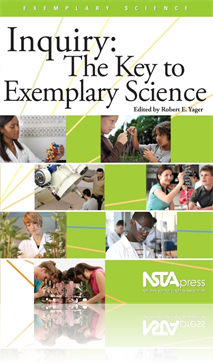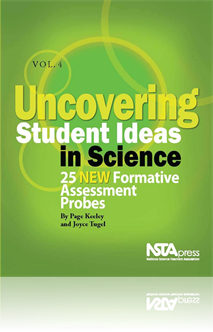All Book Chapters
Book Chapter
Ecological Monitoring Provides a Thematic Foundation for Student Inquiry
The Project in Hawaii’s Intertidal (OPIHI) is a network of schools and scientist volunteers engaged in the widespread, systematic monitoring of Hawaii’s rocky intertidal zones. OPIHI originated through a partnership funded by the National Science...
Book Chapter
“If We Are Supposed to Understand Science, Shouldn’t We Be Doing It?”
The author’s teaching career, like many others, began teaching high school in a basic science classroom where the students asked this chapter’s title question. But if students were going to be successful in inquiry-based science, these new ways o...
Book Chapter
Inquiry: A Challenge for Changing the Teaching of Science in Connecticut
A catalyst for inquiry gaining its rightful place of importance in Connecticut public education was the State Board of Education’s 2004 adoption of the Core Science Curriculum Framework (CSDE 2004). The framework includes a set of inquiry standards...
Book Chapter
Learning Science With Inquiry in the Clark County School District
In 2005, Project PASS—Proficiency And Success in Science—was funded as a Mathematics and Science Partnership by the Nevada Department of Education. This three-year collaborative project was initiated with the goals of improved quality of instruct...
Book Chapter
Natural Scientists: Children in Charge
This chapter discusses how the authors refined their teaching practices to allow young children to begin to develop inquiry process skills. In previous years, the process skills of science were addressed because educators felt they were vital to all ...
Book Chapter
Science Is Not a Spectator Sport: Three Principles From 15 years of Project <em>Dragonfly</em>
Project Dragonfly at Miami University was founded on the premise that the most powerful way to engage children in learning is to celebrate their voices, to invite them into the community of discovery, and to allow them to see themselves as agents of ...
Book Chapter
Student Inquiry and Research: Developing Students’ Authentic Inquiry Skills
In the 2005 NSTA monograph Exemplary Science in Grades 9–12: Standards-Based Success Stories, the authors present and discussed student inquiry at the Illinois Mathematics and Science Academy (IMSA) (Scheppler et al. 2005). This monograph focused o...
Book Chapter
From Wyoming to Florida, They Ask, “Why Wasn’t I Taught This Way?”
As educators recognize the power of inquiry in the classroom, the Conceptual Change Model (CCM) is gaining popularity across the country. Those who are using CCM are reporting that students are highly engaged and excited about learning and they are g...
Book Chapter
Student Outreach Initiative: Sowing the Seeds of Future Success
This chapter features the Student Outreach Initiative project developed as a collaborative research community between USDA/Agricultural Research Service/Southern Plains Area (ARS/SPA) laboratories and their local communities and schools (grades 4–1...
Book Chapter
Developing Inquiry Skills Along a Teacher Professional Continuum
The setting for this chapter is Bradley University—a midsize, private, comprehensive university in a Midwestern community of approximately a quarter million people. In the past decade, new faculty members have brought philosophies of teaching that ...
Book Chapter
Promoting Inquiry With Preservice Elementary Teachers Through a Science Content Course
Inquiry science teaching is effective at all levels, from elementary classes to higher education. It is important, therefore, that preservice education majors who will be teaching science understand the differences between inquiry instruction and ins...
Book Chapter
Developing a Relationship With Science Through Authentic Inquiry
In this chapter, the authors first describe the theoretical framework they have developed for understanding and developing their work as teachers. They start by articulating their own understanding of teaching and learning. Following this discussion,...
Book Chapter
The purpose of this assessment probe is to elicit students' ideas about systems. The probe is designed to find out whether students can recognize that things with parts that interact or influence each other are systems....
Book Chapter
The purpose of this assessment probe is to elicit students' ideas about the digestive system. The probe is designed to find out whether students realize a main function of the digestive system is to break food down into molecules that can be used by ...
Book Chapter
The purpose of this assessment probe is to elicit students' ideas about the distribution of land, oceans, freshwater, and ice. The probe is designed to find out whether students realize that most of the Earth is covered by oceans....



